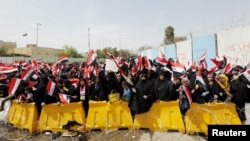While a U.S.-led coalition works to stamp out Islamic State-linked atrocities, such as Wednesday's bombings in Baghdad that killed dozens, concern is growing that the effort could be hampered by internal political turmoil in Iraq, as well as in Turkey.
In Iraq, frustration over the perceived failure of the nation's politicians to reform a policy system that many Iraqis blame for corruption boiled over in late April when supporters of Shi’ite cleric Muqtada al-Sadr stormed Baghdad’s Green Zone.
The Iraqi government has since tried to clamp down on protests, but underlying challenges remain between the country’s highly polarized political factions.
It is the type of political chaos that serves the interests of Iraq’s enemies, mainly the Islamic State, said U.N. Special Representative to Iraq Jan Kubis in a recent briefing to the Security Council.
Experts say securing a legitimate and responsive government could be the key to long-term stabilization in Iraq.
“Ultimately, we don’t see insurgencies or terrorists activities on this scale in countries where governments are responsive to the needs and demands of their populations,” said Nussaibah Younis, a Middle East analyst at the Atlantic Council.
Experts call for two-pronged approach
She noted that the U.S.–led focus on military efforts to oust Islamic State militants in Iraq could have limited results.
“We are not going to really tackle the root causes that are driving radicalization in Iraq unless we really deal with what these protesters are pointing out - which is that the Iraqi government is corrupt and inefficient and has really failed to deliver even the most basic services,” said Younis.
In Turkey, the abrupt resignation of Prime Minister Ahmet Davutoglu this month leaves the U.S. without one of its key allies in the country.
Perry Cammack of the Carnegie Endowment for International Peace observes, “It complicates things insofar as Davutoglu was very well known in Washington. He was, of course, the architect of Turkish foreign policy over the last several years.”
He added, though, that the U.S. has little leverage in Turkey’s internal politics.
Turkey has been a strong partner in the anti-Islamic State coalition, according to the State Department, and it says that is something it expects to continue despite the country’s political dynamics.
“Turkey is not blind to the threat that it faces on its own, its own soil along its border, so Turkey is very aware,” said State Department spokeswoman Elizabeth Trudeau.
A key concern for the U.S. in both countries, analysts point up, is striking a balance between offering support without being perceived as meddling.






